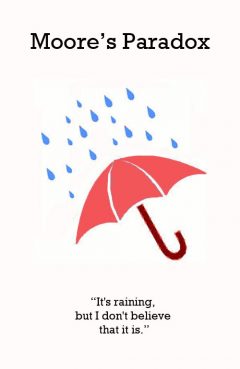Moore's Paradox

Release Date: //
Country of Release:
Length:
MPAA:
Medium: Paradox
Genre:
Release Message: "It's raining, but I don't believe that it is." Authored by G. E. Moore.
Description: Concerns the apparent absurdity involved in asserting a first-person present-tense sentence such as, "It's raining but I don't believe that it is raining" or "It's raining but I believe that it is not raining." The first author to note this apparent absurdity was G.E. Moore.[1] These 'Moorean' sentences, as they have become known, are paradoxical in that while they appear absurd, they nevertheless: can be true, are (logically) consistent, and moreover are not (obviously) contradictions. The term 'Moore's Paradox' is attributed to Ludwig Wittgenstein, who considered the paradox Moore's most important contribution to philosophy. Wittgenstein wrote about the paradox extensively in his later writings, which brought Moore's Paradox the attention it would not have otherwise received. Moore's Paradox has also been connected to many other of the well-known logical paradoxes including, though not limited to, the liar paradox, the knower paradox, the unexpected hanging paradox, and the Preface paradox. There is currently no generally accepted explanation of Moore's Paradox in the philosophical literature. However, while Moore's Paradox remains a philosophical curiosity, Moorean-type sentences are used by logicians, computer scientists, and those working in the artificial intelligence community as examples of cases in which a knowledge, belief, or information system is unsuccessful in updating its knowledge/belief/information store in light of new or novel information.